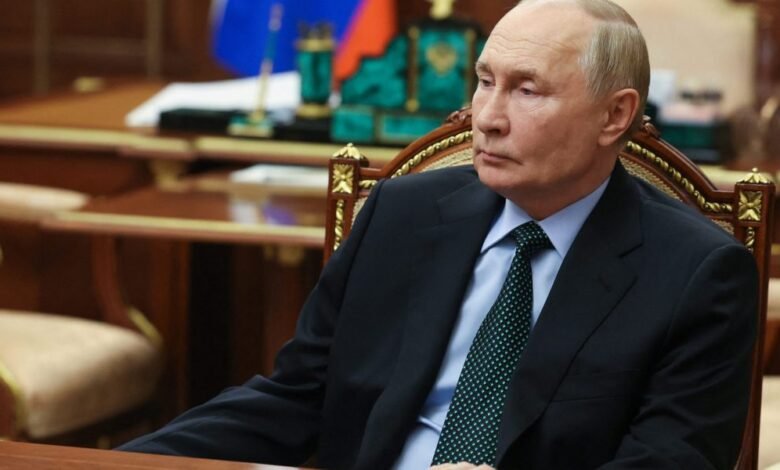Here’s how escalating Russia tensions could impact markets and supply chains, according to experts


As the yearslong Russia-Ukraine war intensifies, experts say some key components of the modern economy could be at risk, and markets are still guessing as to what the conflict could bring next.
On Sunday, President Biden gave Ukraine permission to use U.S.-made long-range missiles to strike deep into Russian territory, a move marking a stark reversal from the administration a mere two months before leaving office. Ukraine quickly seized on the newfound permission to strike a facility in the Bryansk region Tuesday using U.S.-made missiles, Russia’s Defense Ministry said. In response, Russian President Vladimir Putin lowered the country’s threshold for using nuclear weapons, a clear warning to the West.
Due in part to the escalating aggression, all three major indexes fell early Tuesday, with the Dow dropping about 450 points and the S&P 500 dropping 0.5% soon after market open. Yet, by the end of the day, markets were mixed, with the Nasdaq jumping 1%, fueled in part by Nvidia earnings, and the S&P notching a 0.3% advance. Meanwhile, the Dow fell about 0.3%, or 120.66 points.
Fueling the market whipsaw was the uncertainty of Russia’s response to Ukraine’s latest strike, economist Aleksandar Tomic, the associate dean for strategy, innovation, & technology at Boston College’s Woods College of Advancing Studies, told Fortune.
While stocks have been on the upswing in recent weeks since President-elect Donald Trump won the White House, there has been some volatility recently, said Tomic, and geopolitical issues are adding to the uncertainty.
“The Ukrainians did what they did, now, the question is, what do the Russians do to retaliate,” Tomic said. “And I think what it is, is that nobody knows, so that breeds uncertainty, and then markets react to uncertainty.”
Another way that an escalated conflict in Ukraine could affect markets is through the threat to natural resources that make up semiconductors, which are already facing a shortage, said Usha Haley, an international business professor at Wichita State University. Key components of semiconductors, such as Palladium and Neon are found either in Russia or Ukraine, Haley told Fortune.
“Semiconductors are central to many US industries, so these shortages and resulting production delays will likely have broad economic impact through supply chains and lead to more inflation,” Haley said.
Still, Tomic said the risk of the Russia-Ukraine war having a major impact on markets is likely overblown because investors have already priced in the risks during the nearly four-year-long conflict. Other geopolitical concerns such as Trump’s proposed tariffs on imported foreign products are more likely to have an impact, Tomic said.
“I don’t expect that this [conflict] would be a big driver for any kind of market activity, barring, again, something like Russia launching this housing to Germany, or something silly like that. Then, of course, it would be a whole new reality.”
Still, in part because of geopolitical instability and the threat of tariffs and inflation resurgence, Gold saw a 0.6% increase while Bitcoin reached an all-time high of $94,000 before retreating.
With the strikes Tuesday, Ukraine may be trying to gain an advantage ahead of any possible policy changes made by Trump as regards Ukraine in January, Tomic said. Trump has previously said he could end the Russia-Ukraine war in “24 hours.”
Earlier this month, a former adviser to the president-elect said Trump would prioritize ending the conflict over regaining Russia-held territories such as Crimea for Ukraine, the BBC reported. On the prediction market Polymarket, which predicted Trump’s election victory, the odds of him ending the war in Ukraine in his first 90 days sat at 38% as of Tuesday.
While the conflict may not have an outsized effect on U.S. markets, Europe may be a different story. Germany’s foreign minister Annalena Baerbock said Tuesday that the country would not be intimidated by Putin’s lowering of Russia’s nuclear threshold.
Yet, because of their proximity to the conflict, countries such as Germany may be more affected by an escalation, especially if nuclear weapons are involved. Partly because of this risk, indexes in Germany, France, and Spain all closed down more than 0.5% Tuesday.
In the worst case scenario, Putin could expand the conflict into Poland or Germany and get NATO to engage or even launch a cyberattack on the U.S., said Tomic.
“The question is, what exactly are they capable of,” he said.
Source link




